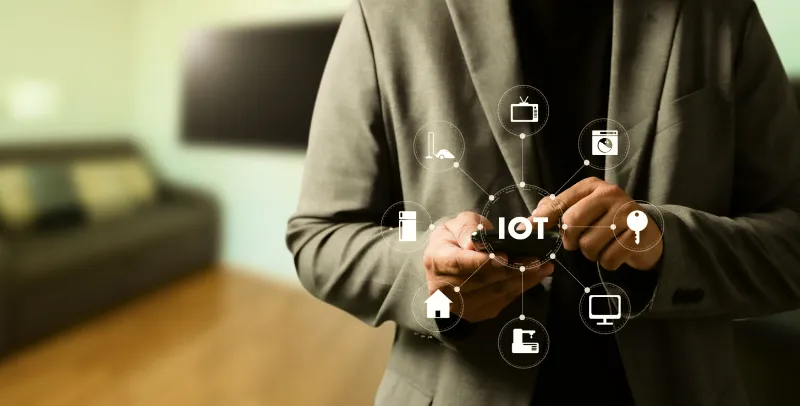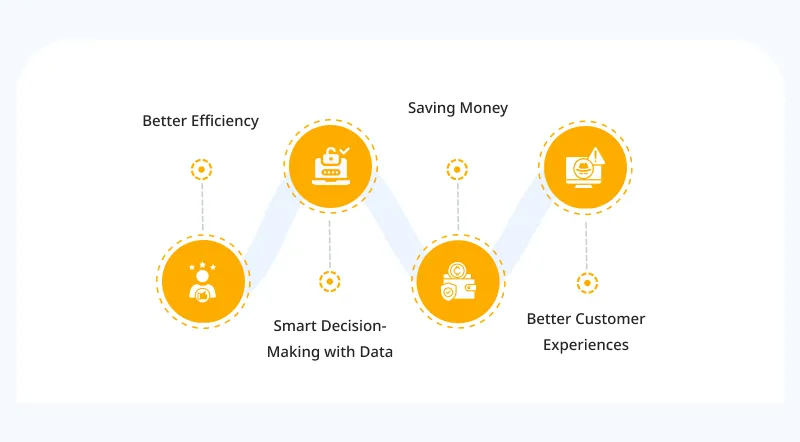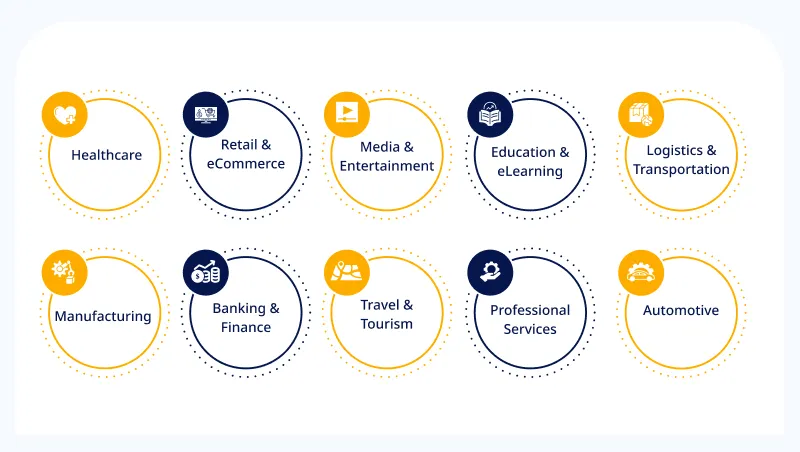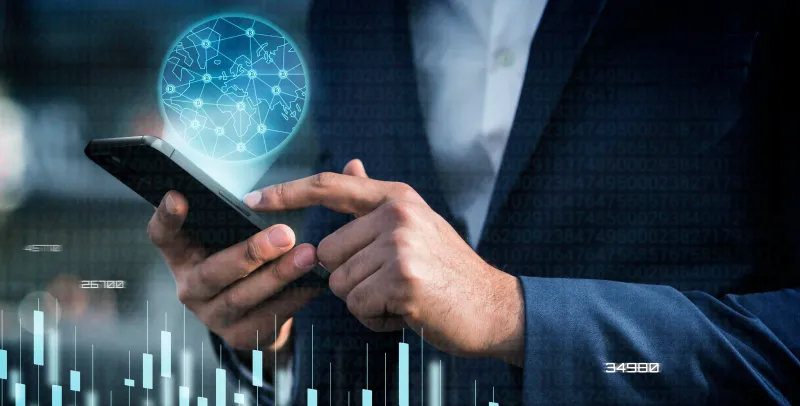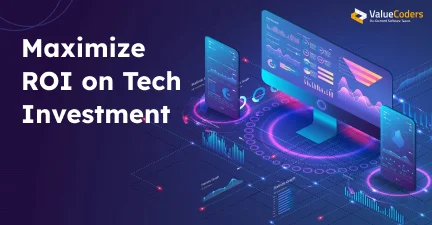Did you know that the number of IoT-connected devices is expected to reach over 25 billion by 2030?
With this growth, IoT has emerged as the most in-demand technology for digital transformation. One of the reasons behind its popularity is that it offers benefits to users and businesses alike.
Recently, IoT adoption has revolutionized almost every industry in this digital age.
Businesses are adopting and utilizing IoT to drive improvement in operations while resolving operational difficulties.
According to FortuneBusinessInsights, the IoT market will reach $3,352.97 billion by 2030 at a compound annual growth rate of 26.1% from $662.21 billion in 2023.
This blog post will explore IoT use cases and some of the trending statistics that show the importance of IoT across various industries in 2025 and the coming years.
Before we start discussing IoT use cases and stats in detail, let’s understand what IoT exactly is.
What is the Internet of Things?
IoT, or the Internet of Things, has multiple definitions that depend on the author or writer’s perspective. But, according to IBM,
“The Internet of Things (IoT) refers to a network of physical devices, vehicles, appliances, and other physical objects that are embedded with sensors, software, and network connectivity, allowing them to collect and share data.”
Also known as “smart objects”, IoT devices may include simple smart home devices like smart thermostats and complex industrial machinery and transportation systems to wearable devices like smartwatches or RFID-enabled clothing.
IoT is a technology that assists these smart devices to communicate with each other and also with other internet-connected devices. These include smartphones that are creating a huge network of interconnected devices that can perform multiple tasks and exchange data simultaneously. This includes:
- Monitoring environmental conditions in farms.
- Controlling machines and processes in factories.
- Managing traffic patterns with smart cars and other smart automotive devices.
- Tracking inventory and shipments in warehouses.
IoT has vast and varied potential and various industries have already seen its impact. As the number of internet-connected devices are continuously increasing, IoT is will continue to play a important role and will change the way we live, work and interact with each other.
Discover how ValueCoders' expertise in IoT can drive tangible results and growth for your business.
In the context of enterprises, IoT devices are used to monitor temperature, air quality, humidity, machine performance, energy consumption, and more. Industrial IoT Solutions play a key role here, enhancing operational efficiency and driving innovation
Further, this data can be used to analyze patterns, trends, and anomalities in the real-time which assists businesses optimize and improve their operations.
Interesting IoT Stats
The Internet of Things (IoT) is a continuously evolving field with a significant impact across various industries. Let’s look at some of the interesting IoT statistics and facts that shows IoT reshaping the current & future market:
- The IoT industry may reach $1 trillion by 2024.
- According to Cisco, by 2030, 500 billion devices will be connected to the internet.
- In 2023, there were about 16.7 billion IoT devices worldwide, a significant increase from the 12 billion devices in 2021.
- IoT Analytics estimates that there will be over 27 billion IoT devices by 2025.
- Smartphones account for a large portion of IoT devices, with around 5.3 billion unique smartphone users in Q4 2023.
- The global IoT market may grow to around $3.3 trillion by 2030.
- IoT Analytics reports that for over 50% of business-related IoT projects cost savings are the primary revenue support.
- There were 1.5 billion cyberattacks focused on IoT devices in 2021.
- The Agricultural IoT market is expected to reach $5.18 billion by the end of 2023 and $6.98 billion in 2025.
- By the end of 2023, revenue from the automotive IoT market is expected to reach $397.2 billion, growing to $882 billion by 2028.
These numbers indicate that the IoT examples market is thriving and has a lot of potential, but there are also challenges and chances to consider.
As we’ve observed, IoT is reshaping many different industries, like manufacturing, agriculture, healthcare, and automotive.
It’s bringing new ways to be more efficient, develop new ideas, and make things better for users.
Yet, there’s a rise in worries about security and privacy as more things connect to the internet.
As IoT keeps expanding, it’s important to deal with these problems and make sure we utilize this technology to help both businesses and customers.
Also read: IoT Vs AI
Benefits of the Internet of Things Across Industries
Integrating IoT development solutions into your business helps you set up a system to control and keep an eye on things by effectively communicating well and using data.
As businesses expand, owners look for successful business strategies which often begin with dealing with more complicated tasks.
This can make things less efficient, make adaptation slower, and can even put the businesses’ stability at risk.
Here, IoT solutions can help with things like making different systems work together better, changing how the business operates, and improving how tasks get done.
This opens up new chances for growth while also making sure the business can stay going strong.
IoT is essential for businesses for many key reasons. Here’s why:
1. Better Efficiency
With IoT devices, businesses can make processes smoother and faster. For instance, sensors can inspect the machinery and detect issues before they become big issues, saving money on repairs and keeping things running smoothly.
2. Smart Decision-Making with Data
IoT devices generate huge data that can be used by businesses to make smarter choices. It can even come up with new ways of doing things easily. By looking at this data, businesses can better understand their customers, spot trends, and figure out how to improve their products and services.
Tap into ValueCoders' vast experience to lead the industry with groundbreaking IoT solutions.
3. Save on Costs
By cutting down on manual work and letting IoT devices handle repetitive tasks, businesses can save money and make more profit. For example, these devices; can help monitor energy usage and find ways to use less, which saves money and is good for the environment too.
4. Better Customer Experiences
Using IoT, businesses can understand more about what their customers like and dislike. This helps them offer more personalized and exciting experiences. For example, stores can use sensors to see what customers visit and then offer them deals based on what they’re interested in.
IoT Use Cases Across Industries
According to the latest survey by McKinsey, IoT is expected to bring a lot more value to business-to-business (B2B) applications than previously thought. They predict that by 2030, around 65% of the total value from IoT will be realized.
Various industries like healthcare, manufacturing, retail, transportation, logistics, and more are looking for ways to utilize the Internet of Things. They are exploring ways to use IoT applications to make their operations better and processes simpler. This not only helps them run more smoothly but also makes a bigger impact and brings more benefits.
Let’s take a look at some of the best IoT use cases across different industries in their businesses.
1. IoT in Healthcare
The IoT in healthcare offers some key benefits such as wearable devices. These devices allow hospitals to track patients’ health even when they are at their home comfort.
Additionally, these wearable devices reduce the need for patients to stay in the hospital while still providing essential and up-to-date patient information that could save lives.
Smart beds in hospitals are another great example of IoT in healthcare. These innovative beds are equipped with technology that helps hospital staff know real-time information of the beds availability. This results in reduced wait times for patients in need of beds.
Plus, putting IoT sensors on important devices means there are fewer breakdowns and more reliability, which can be critical in life-or-death situations.
IoT use cases also make elderly care easier. Along with monitoring health at home, sensors can detect if someone falls or is having a heart attack. This helps in ensuring that elderly patients get quick assistance.
2. IoT in Retail & eCommerce
Internet of Things applications have also changed customer experiences and operational efficiency for the retail and eCommerce sectors.
An example of IoT here is smart shelves. It automatically tracks inventory levels, reducing out-of-stock situations and improving restocking accuracy.
Beacon technology also helps send personalized promotions to shoppers’ smartphones based on their location in the store, enhancing user engagement.
Furthermore, IoT-enabled checkout processes streamline transactions, offering convenience and reducing wait times.
Retailers can utilize IoT to optimize operations, enhance customer satisfaction, and stand out in the digital marketplace.
3. IoT in Media & Entertainment
IoT use cases show that it is changing how things are made, sent, and enjoyed in the media and entertainment world.
Smart devices give suggestions for things to watch or read based on what people like and what they’ve looked at before, which keeps them interested.
In theaters and other places, sensors watch how the audience is reacting and change things to make the experience better while it’s happening.
Additionally, IoT-connected analytics provide valuable insights into audience demographics and viewing habits. It helps in offering targeted advertising and content strategies.
Media and entertainment companies utilize IoT to optimize content delivery, tailor experiences, and provide audience satisfaction.
4. IoT in Education & eLearning
IoT is redefining the learning experience in the education sector as well. Smart classrooms armed with IoT devices improve student engagement and collaboration.
Interactive whiteboards and smart projectors are examples of IoT devices that facilitate dynamic teaching methods, offering diverse learning styles.
IoT sensors monitor the classroom atmosphere, offering improved comfort and productivity.
Additionally, wearable devices keep track of how well students are doing and give them feedback that’s tailored to them, which helps them learn on their own.
Also, virtual and augmented reality technologies connected to IoT make learning more fun and interactive, so students remember and understand better.
By integrating IoT into education & eLearning sector, institutions can create innovative learning environments, improve academic consequences, and prepare students for the digital age.
5. IoT in Logistics & Transportation
In logistics and transportation, IoT use cases are transforming how items are moved in an efficient and safe way.
Sensor-armed vehicles provide real-time tracking and monitoring of shipments. This improves visibility while reducing the risk of loss or theft.
Smart warehouses also use IoT devices to automate inventory management, enhance storage space and streamlining operations.
Additionally, IoT-enabled predictive analytics data helps in diligent maintenance of fleet vehicles, reducing downtime and preventing reliability.
Route optimization software powered by IoT helps cut down on fuel use and emissions, which is good for the environment and supports sustainability efforts.
In logistics and transportation sector, top IoT development companies can make operations smoother, let customers know more about how things are moving, and provide better service.
Discover how ValueCoders can streamline your supply chain processes with tailored IoT solutions.
6. IoT in Manufacturing
IoT is transforming manufacturing by improving how things are made, making production more efficient, and ensuring better quality.
Smart sensors connected to machines keep track of how they’re doing things in real-time.
They catch problems early so they don’t become big issues, keeping downtime to a minimum and making maintenance schedules more efficient.
Additionally, predictive analytics powered by IoT help predict demand, manage inventory better, and coordinate the supply chain. This saves money and makes things run smoother, making businesses more productive.
Moreover, IoT use cases help machines communicate and work together smoothly. This allows manufacturing to be more flexible and able to quickly respond to what customers want.
By using IoT technology, manufacturers can see better how their operations are going, make better decisions, and keep making their processes better over time. This helps them make more money and stay ahead in the global market.
Also Read: How To Integrate IoT With Wearables To Enhance Fitness & Health Tracking
7. IoT in Banking & Finance
IoT is making a difference in how banks and finance companies handle customer service, security, and how smoothly they work.
Smart devices make transactions easier and make banking more personal, which makes customers happier and more likely to stick with the bank.
IoT sensors monitor ATMs and bank branches, detecting irregularities and ensuring secure operations.
Additionally, using things like fingerprints or wearable gadgets makes it easy and safe to use financial services.
Also, analyzing data with IoT helps see how customers act and what’s happening in the market, which helps make smarter choices and give better advice.
With IoT technology, banks and financial companies can make their service better, keep things safe, and stay ahead of the game.
8. IoT in Travel & Tourism
In the travel and tourism sector, IoT is improving travelers’ experiences and streamlining business operations.
Devices such as smartwatches and phone apps give travelers customized advice and make booking trips easy, which makes customers happier.
Also, sensors in airports and hotels make checking in easier and keep an eye on things like repairs and safety, so travelers have a smooth experience.
Moreover, analyzing data with IoT helps businesses understand how people travel and what they like so they can offer better services and marketing.
By using IoT, the travel industry can make trips easier, safer, and more enjoyable for travelers all over the world.
9. IoT in Professional Services
In professional services, IoT is optimizing operations and delivering value-added solutions to clients.
Smart devices make work easier by doing things automatically and giving instant information. Also, sensors in offices keep track of things like energy use and the environment, which helps save money and be more sustainable.
Also, connecting IoT with wearable devices lets companies keep an eye on their workers from far away, which makes serving customers better and keeps them happy.
Plus, using IoT to analyze data helps understand what customers want and what’s happening in the market, so businesses can make smarter choices and plan better for the future.
By adopting IoT technology, professional service firms can use IoT examples to come up with new ideas, make their work smoother, and offer better services to clients in today’s competitive world.
10. IoT in Automotive
In the automotive sector, IoT is changing how cars work and how people feel when they drive them.
Cars that connect to the internet using IoT technology can check themselves and predict when they need fixing, as well as having extra safety features.
Also, smart navigation systems suggest the best routes for each person and give updates on traffic, making trips smoother.
Sensors in cars collect information about how they’re driven and how well they’re working. This helps insurance companies figure out how risky someone is to insure and offer personalized insurance plans.
Also, systems that let cars talk to each other and to things like traffic lights make roads safer and help manage traffic.
By using IoT advancements, automotive manufacturers are making cars that are smarter, safer, and use less fuel, to keep up with what people want and change how we get around.
The Future of the Internet of Things
The future of the Internet of Things (IoT) has a lot of potential to change our lives and jobs. As IoT gets better, we’ll probably see more things connected to each other, making our homes, cities, and jobs work better.
Rely on ValueCoders' expertise to safeguard your brand's future with robust IoT implementations.
From smart homes that anticipate our needs to cities equipped with IoT sensors for better urban planning and resource management, the possibilities are endless.
Moreover, IoT will be crucial in sectors like healthcare, agriculture, and energy, revolutionizing how we approach these industries.
As we enter the future of IoT, we can expect a world that’s more connected, smarter, and better for the environment. So, consider hiring IoT developers to unlock all its possibilities.
Conclusion
The Internet of Things is changing how industries work and how we live every day. It’s making things work better, faster, and with new ideas.
As we’ve seen, a lot of use cases IoT, like making homes smarter, helping with healthcare, and making factories run better.
Key Takeaways:
- IoT allows real-time data exchange between devices, systems, and people.
- Applications span consumer, enterprise, industrial, and public sectors.
- Potential for transformative solutions that drive productivity and competitiveness.
Is your business IoT-ready? Utilize the expertise of IoT application development services company like ValueCoders‘ IoT professionals to design, develop, and deploy cutting-edge IoT solutions tailored to your needs. Capitalize on the power of interconnected intelligence.
Schedule a consultation today to explore how IoT can revolutionize your operations!


